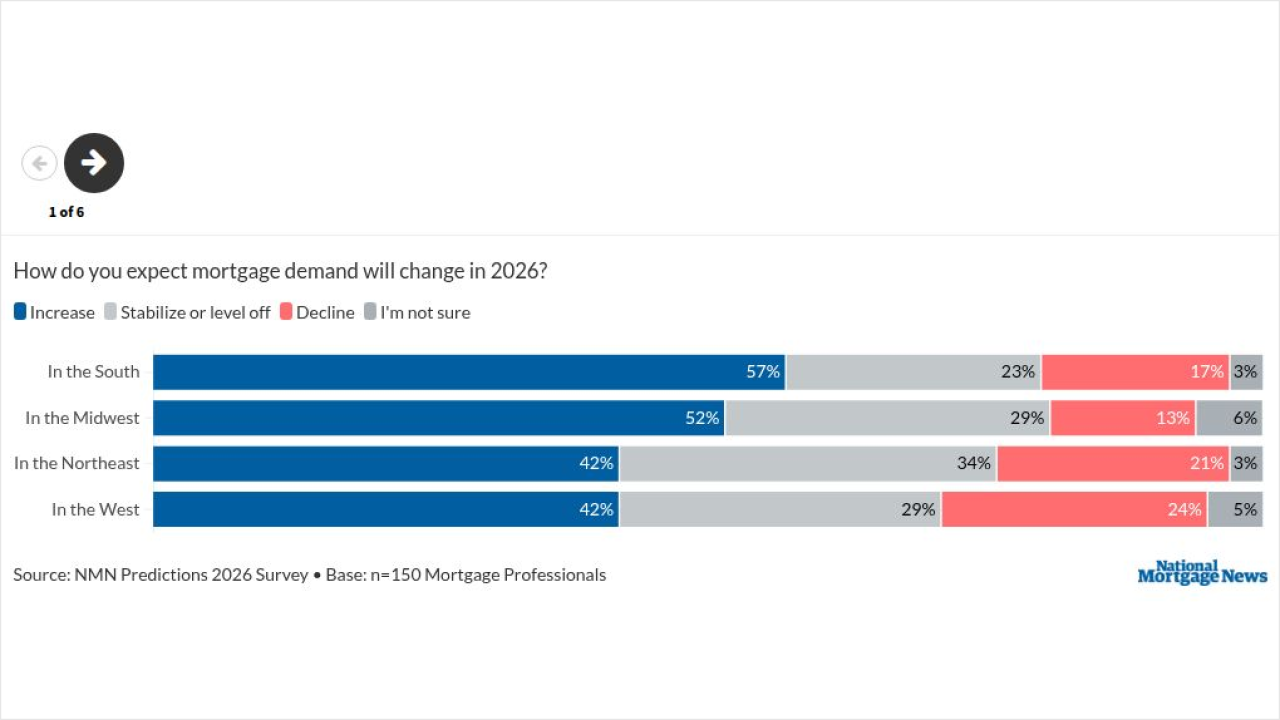The Mortgage Bankers Association has formally asked the Federal Housing Finance Agency for help with
The letter takes issue with the additional price adjustments for loans being sold to Fannie Mae and Freddie Mac that are attached to borrowers who have a debt-to-income ratio above 40%. Bob Broeksmit, president and CEO of the Mortgage Bankers Association, has previously expressed concern about the complications created by using frequently fluctuating DTIs in pricing, but the letter now specifies which portion of the grid raises the most concern, while asking for it to be removed.
The letter also requests a meeting with FHFA Director Sandra Thompson to hear lender concerns about the operational issues posed by this particular loan metric. The price fluctuations created by using DTI can be difficult to explain in interactions with consumers, he argued.
"We're used to grids with loan-to-value ratio and credit score adjustments, so I don't think that adding a few will operationally cripple anybody," said Broeksmit in a recent interview about the May price changes. "But I can assure you that the DTI factor is going to be very difficult to implement and result in a lot of difficult conversations with consumers."
Operational challenges specified in the letter include the impact on self-employed workers that are particularly prone to fluctuations in debt and income, and required fee disclosures that those dynamic variations complicate.
"Such pricing changes may result in difficult compliance challenges as lenders are forced to evaluate if such changes constitute a valid change in circumstance under
Because these TILA-RESPA integrated disclosures were aimed at ensuring borrowers aren't surprised by pricing changes added as the mortgage goes through the origination process, the debt-to-income based fee related to the rule could create reputational and compliance problems for mortgage companies.
Concern about this may be heightened by the fact that the Consumer Financial Protection Bureau, which has oversight over the disclosures, has recently shown renewed concern about ensuring consumers have price transparency and the ability to choose a loan without steering.
An advisory opinion from the bureau published Tuesday revolves around RESPA Section 8's applicability to digital mortgage comparison-shopping platforms, and while it's aimed more at concerns related to kickbacks than other aspects of pricing, it generally suggests the bureau is keeping an eye on practices governed by that statute.
"Lenders are concerned multiple pricing changes could jeopardize borrower trust and lead to the appearance of a 'bait and switch' when offering loan pricing," Broeksmit said in the letter.
Furthermore, Broeksmit noted concerns about complications the new pricing creates for the quality control checks lenders do after a loan closes and before it's sold. The QC process is important because Fannie and Freddie, which buy a significant number of mortgages in the United States, can call upon lenders to buy back loans delivered to them if they find flaws.
"Lenders are currently facing a rising number of repurchase requests from the GSEs, the majority of which are related to income calculations, according to data from the enterprises," the letter notes. "The addition of a hard DTI pricing threshold could increase the frequency of 'defects' for minor calculation changes."
Finally, the letter details industry concerns Broeksmit has previously expressed about the use of DTI as a differentiator and how effective it may be in predicting a borrower's ability to repay. He noted that it was previously removed from the
The FHFA declined to comment on the letter.
The agency may be able to revise the pricing grid if it makes adjustments to a rule that affects the size of the capital buffer the GSEs have to hold against financial risks.
To maintain that buffer, the FHFA has had to offset the price breaks it's been providing to loans that accommodate borrowers with lower incomes with increased fees for mortgages like those with a DTI greater than 40%.
If borrowers meet other affordability criteria such as certain income limits that
Lenders are "continuing to adjust" pricing operations for the discounts granted to affordability buyers, which Thompson announced at the MBA's annual meeting. Broeksmit said these have "significantly rebalanced the LLPA framework toward mission-focused lending."
While the industry has shown some appreciation for those price breaks, it has been concerned about the counterbalancing increases in fees, which multiple groups have characterized as outweighing the discounts slightly.
Mortgage brokers have shown particular concern about a
Brokers, mortgage bankers and Realtors all have expressed broad worries about May's more extensive revamp of the grid representing an increase in costs for borrowers on a net basis, and like the MBA, real estate professionals have specifically shown concern about the DTI changes.
The National Association of Realtors said in a recent press statement that it has been supportive of "most of the changes made to LLPAs this past fall" but the debt-to-income adjustments are among the exceptions.
"Fees are raised on some borrowers with good credit scores and moderate down payments, hitting middle-wealth homebuyers," President Kenny Parcell said. "Furthermore, FHFA included new fees on borrowers with higher debt-to-income scores."




